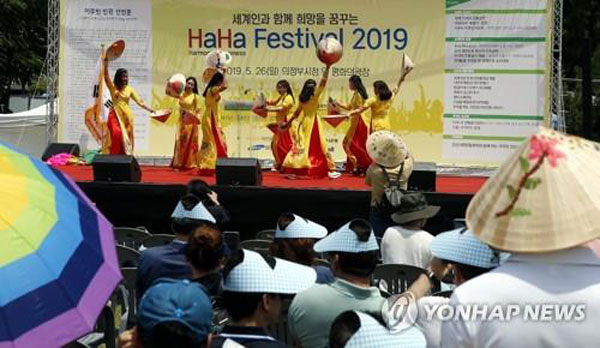The number of foreigners staying in South Korea increased by nearly 9 percent last year, with the rate of illegal foreign workers also rising 15 percent, government data showed Tuesday.
According to data released by the Ministry of Justice, 2,367,607 foreigners were residing in the country as of the end of 2018, marking a rise of 8.6 percent from a year earlier.

As a result, the proportion of foreigners, including short-term stayers, in the nation's population rose to 4.57 percent last year, compared with 3.5 percent in 2014. In other words, between four and five out of 100 people in South Korea are foreigners.
Vietnamese women living in South Korea perform a Vietnamese traditional dance during a multicultural festival in Uijeongbu, north of Seoul, on May 26, 2019. (Yonhap.
Vietnamese women living in South Korea perform a Vietnamese traditional dance during a multicultural festival in Uijeongbu, north of Seoul, on May 26, 2019. (Yonhap)
hide caption
Vietnamese women living in South Korea perform a Vietnamese traditional dance during a multicultural festival in Uijeongbu, north of Seoul, on May 26, 2019. (Yonhap)
By nationality, Chinese nationals, including ethnic Koreans, still form the largest group of foreign nationals, accounting for 45.2 percent, or 1,070,566, of the foreign population, the ministry said.
Thais came next with 197,764 residents (8.4 percent), followed by Vietnamese with 196,633 (8.3 percent), Americans with 151,018 (6.4 percent), Uzbeks with 68,433 (2.9 percent) and Japanese with 60,878 (2.6 percent).
The ministry noted the number of foreign students studying in South Korea increased 18.9 percent on-year to 160,671 as of the end of last year.
The rate of illegal stayers of the total foreign population also rose from 11.5 percent to 15 percent in the 2017-18 period, it said.
Ministry officials said various factors, including steady increases of foreign students and migrant workers, combined to expand the nation's foreign population.

